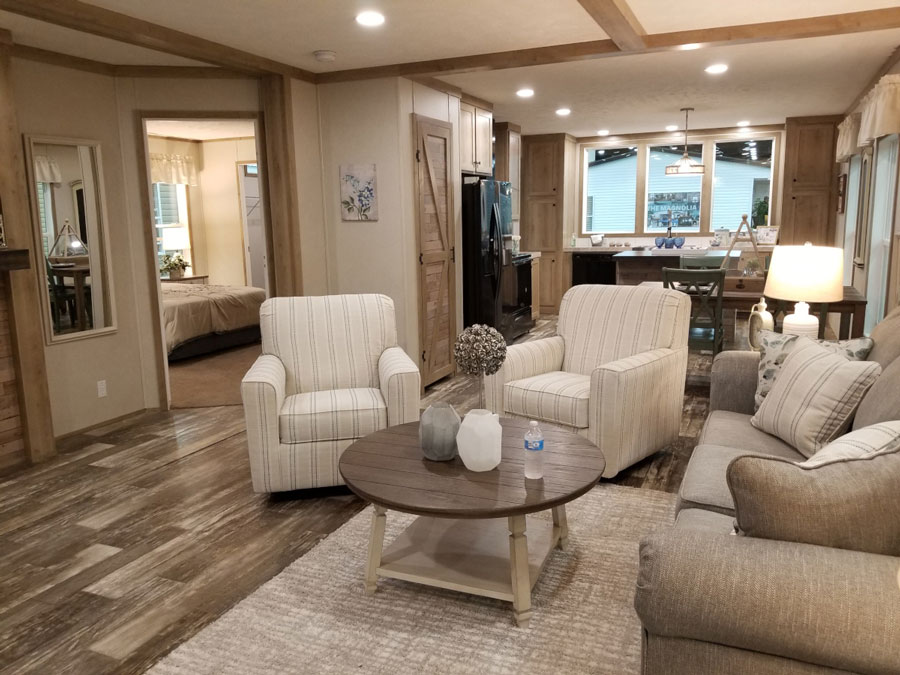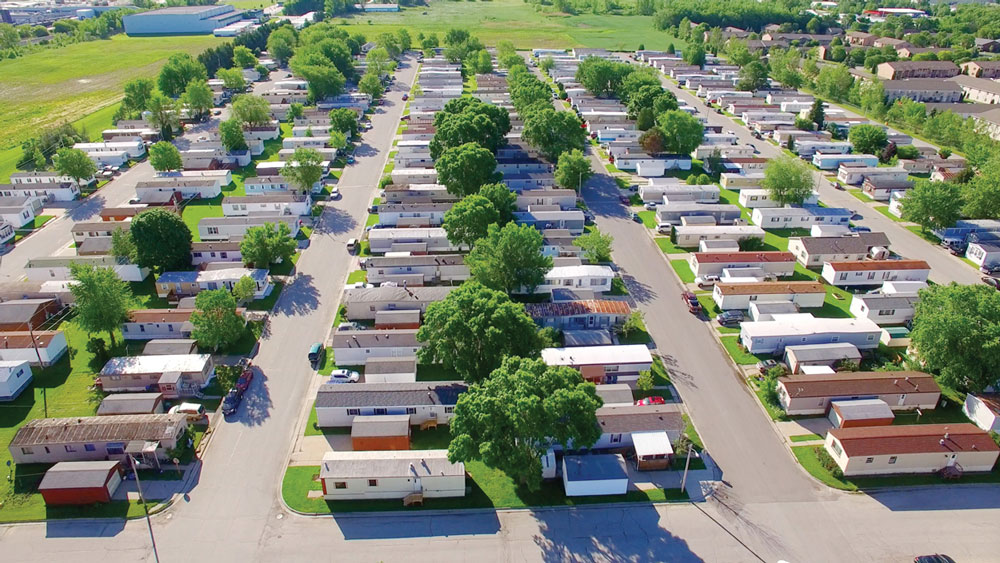1. It’s early yet in the programs, but what if any type of market change have you seen with the emerging presences of CrossMod/MH Advantage/CHOICEHome?
The CrossMod product is an excellent opportunity for our industry to initiate dialogue and educate the public as well as regulators and policymakers on the quality and affordability of manufactured housing. Within the industry, we know and understand that manufactured housing is the most viable solution to the affordable housing crisis in America. However, to continually change and improve the image of manufactured housing is a difficult and slow process. CrossMod is an excellent and new segue into the dialogue that needs to be had. Undoubtedly the positive effect of this education will impact all manufactured housing products, not just CrossMods.
Outside of this education, we, as an industry, need to find a way to solve the zoning issues that prevent these and all HUD homes from going into most municipalities. This dialogue was a significant portion of our most recent MHI Financial Services Division board meeting in Nashville. It’s a real issue that MHI and their membership will be taking on.
2. What type of advantage do you feel these new programs offer lenders/retailers in the manufactured housing industry that is unattainable by originators and servicers of conventional home finance packages?
I think the biggest benefit is affordability followed by speed to build. To be able to have a home built in a factory that rivals site-built housing for significantly less cost per square foot and a much quicker build time is a significant advantage that our industry must take full advantage of.
3. If we assume these new homes and finance programs that can co-exist with standard R1 site-built homes will pare away at the exclusionary zoning practices our industry has experienced, how long do you feel it might take for a notable change to occur? From a consumer lending perspective, how do you forecast and measure this type of change?
This is a big discussion. We need to push on this, presenting to our industry and gathering a task force to explore ways to appropriately approach zoning change. The state associations do a good job of that, they’re the boots on the ground and have relationships with planners and zoning boards of appeal. And MHI really should look to them on this front.
We have the federated states division of MHI, made up of state association directors who would be a primary resource for this area of industry activity… there’s an opportunity to create a set of best practices that will go into a playbook or a tool kit of some kind,
It has been suggested that we urge the federal government to halt Community Development Block Grant (CDBG) funds for local governments that fail to meet a certain threshold of manufactured housing implementation in affordable housing initiatives. But there’s no one approach that’s going to be the ultimate solution. It will be a combination of approaches that will be a solution that works over time. The sticking point is that we’ve been at this type of effort for some time, and we don’t want to look back in another few years and say ‘Man, we should have done more or we should have done this differently.’ The important time to make that positive change is now.

4. Tell us how your chattel lending programs have fared in the last year or so? Are you seeing an uptick in activity?
Although Cascade has provided land/home financing in the manufactured housing industry for over 20 years, we have only been lending on chattel for about three years. So, with our chattel programs, we really had nowhere to go but up. We have expanded and developed our loan products to assist retailers and communities in expanding their sales. On top of our wide range of loan products, Cascade has invested significant time and resources into developing technology to streamline the lending process for consumers and retailers alike. With the development of our digital loan application, we are getting a full prequalification with income, credit, and other applicable qualification guidelines considered back to the borrowers and retailers in less than two minutes. This type of technology gives retailers and communities the ability to sign and execute contracts before the borrower leaves the sales center. Site-built lenders have had this technology for years, our industry has lagged slightly behind. But at Cascade, we have addressed this and are excited about continuing to develop and streamline the lending process for our clients. We believe that our continued advancements in technology and lending programs will positively impact a boost in unit sales for the retailers and communities with whom we work.
5. Does the industry in this chattel category continue to be hampered more by the slow-to-grow secondary market or is the lean chattel market more of a reflection of so few new manufactured home communities with reliance on growth coming from existing community expansion?
As you know, the macro backdrop should be highly supportive of demand for chattel as one of the most attractive solutions to the affordable housing crisis. However, there are several forces at play that are impeding growth. There are many that point to a lack of a secondary market in the financing of chattel loans.
In 2019 Cascade executed the first securitization of newly originated manufactured housing loans since 2007. We sold a pool of $174 million of loans to institutional investors. This was a tremendous accomplishment for Cascade, but also for the entire manufactured housing industry. The lack of a secondary market for non-agency and non-government manufactured housing loans has limited lending in our industry. Creating additional liquidity by the closing of our securitization is a huge first step in creating a secondary market.
We will likely issue another larger securitization in the third quarter of this year. While our first one was unrated, we are working with rating agencies now to get this next one rated.
These initiatives should pave the way for more availability of credit for chattel buyers. That will certainly enable Cascade to assist more buyers in achieving the dream of home ownership.
That said, simply improving the financing markets is not enough. The lean chattel market is really a reflection of zoning constraints and a misplaced stigma around the sector. We need a sea change in buyer demand to move the amount of shipments into a place that is consistent with solving the country’s lack of affordable housing.
6. What does the future hold for you? What do you feel is the key to being a successful consumer lender for affordable homes?

We think affordable housing and the work MHI and its membership are doing will continue to help this industry grow, and as shipments go up we’re going to be prepared to create and offer better, more efficient programs to help finance those homes. The industry is about to finally break through the 100,000 shipments level and ideally with the right economic factors, push far beyond it. The industry has some very strong tailwinds right now and Cascade takes very seriously our role to create and provide loan products that will support sustainable industry growth.
7. What are your impressions on the overall climate for the manufactured housing industry?
Clearly this is an unprecedented moment in history. 2020 started with such strong tailwinds but the current situation with COVID-19 has altered every aspect of growth worldwide, not just in our industry. That being said, manufactured housing was the best solution to the affordable housing crisis in the United States prior to the current situation, it is the best solution during the crisis, and manufactured housing will be the best solution after the crisis. Cascade is dedicated to creating better systems for our borrowers, to aid retailers and communities in fulfilling the demand, and we take very seriously our role to create and provide loan products that will support and promote sustainable growth.
Additionally, our message is being well-articulated, and it’s being heard. A few years back it would have been absolutely unfathomable to think that the Secretary of HUD would be advocating for manufactured housing and that we would have homes displayed on the national mall in D.C. It was something we just wouldn’t have thought would happen. And to have Fannie, Freddie, and FHFA coming out to our home shows and conferences to educate themselves and the public as they work toward their Duty to Serve requirements has given the industry visibility that we have not previously enjoyed. It’s a testament to the grit of our industry. We are an industry who rolls up the sleeves, works hard for change, and doesn’t take no for an answer.










